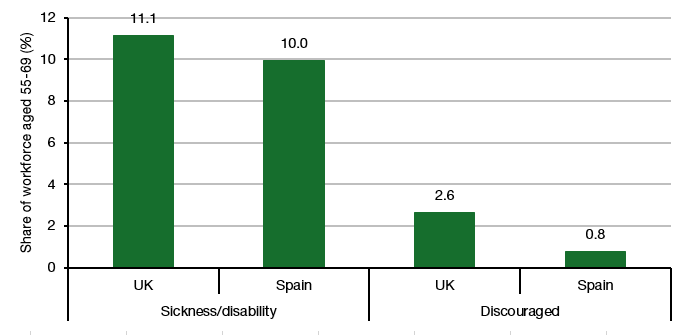Provocative title, I know, but really, my point is that older workers are a benefit to businesses and the economy overall and we should do everything we can (especially in an ageing society) to keep older workers in the workforce for as long as possible.
I have written before about the value older workers can bring to the workforce (see here for a rather left-field example), but I came across a comparison study of the labour force participation among older workers in the UK and Spain that I found interesting.
The UK and Spain are similar countries. Both are rich, western, democratic countries in Europe with an ageing workforce and a heavy dependence on the services sector (in the UK that is mostly professional services, in Spain mostly tourism and health care services). And once the European debt crisis was over, they both had similar growth rates. Though since the end of the pandemic Spain’s economy has grown quite a bit faster than the UK.
Annual real GDP growth in the UK and Spain
Source: Panmure Liberum, Bloomberg
There are of course many reasons for this underperformance of the UK economy, but one that is examined in the research is the labour market participation of people over the age of 55. As you can see in the chart below, during the pandemic, the labour market participation of these older workers declined in the UK, but it continued to increase in Spain and does so to this day.
Labour market participation rates of workers aged 55-69
Source: Barrela et al. (2025).
This isn’t just the result of people in some sectors working longer. The chart below shows that across a wide range of occupations, Spanish workers retire later in life than their British peers.
Average retirement age across occupations
Source: Barrela et al. (2025)
One of the reasons that the authors of the study identify for this difference is that in the UK more people are long-term sick or simply discouraged to find work.
Reasons for not being in work (ages 55-69)
Source: Barrela et al. (2025)
The authors of the study examine where these differences may come from, and they find two main explanations. First, Spain has reformed its unemployment and welfare benefits system in 2019 to significantly increase the incentives for older workers to find work. Workers over the age of 52 can get unlimited unemployment assistance and this assistance will not be cancelled for the first six months recipients are back in work.
Second, in the UK, the components of Universal Credit that require recipients to look for a job were identified as a key incentive to get people back into the workforce while the loss of benefits if people found a job was a disincentive to find a job.
Put together, this research indicates that requiring unemployed people to look for jobs and enabling them to retain some of their unemployment benefits even after they find work can form a strong incentive to get older workers back into the labour force. And that will boost economic growth and as I have discussed previously, will help businesses be more productive because these older workers come with a wealth of experience and skills that younger workers simply don’t have.








Spain is far ahead of us in so many ways. I'd wager it starts with ideology. Here in Germany, if somebody >64 is working, all they get is pity / judgement ("what went wrong in your life that you still have to work at that age?". Or even more ridiculous, "you are stealing a job from a younger person who needs it more".) Whereas in Spain, working means you're a part of society, you're helping somebody out, you've still got that spunk.
Whither the correlations? Spain has the highest longevity in Europe, and a large percentage of crusties in employment. I'd say work helps keep one young and fit.
How about a simple tax incentive for pensioners. If I went out to work my marginal tax rate would soon enter the 40% rate. I have a full state pension and a modest sipp, so why should I work, only to give a big part of any job to HMRC? With maybe 15 years left to me, the prospect of two days* work for nothing will never float my boat. *40% of a week.